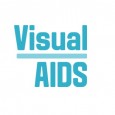
Hunter Reynolds, “Blood Spot, Berlin Sky”
Editors Alyson Campbell and Dirk Gindt have issued a call for essays for an international collection on HIV and AIDS in theater and performance. See below for further information.
Since the introduction of new antiretroviral treatments in the mid-1990s, HIV and AIDS have gradually diminished from cultural agendas in prosperous and politically stable countries of the Global North. On the other hand, there is a certain nostalgia for the theatre and activism of the 1980s and early ’90s. In recent years, there have been acclaimed screen/TV adaptations and stage revivals of plays like Larry Kramer’s The Normal Heart and Tony Kushner’s Angels in America in North America, Europe and Australasia along with exhibitions and documentaries on ACT UP, Gran Fury and other American?based activists. Without denying the legacy and ongoing value of these works and organizations, their canonization risks reproducing the false assumption that new performance responses addressing HIV and AIDS are no longer being created or that theater about HIV and AIDS has become irrelevant after the success of antiretroviral medications. This is a set of perceptions this volume seeks to address.
Meanwhile, performance and community-based theater remain vital tools for many artists and activists in the Global South to spread information about prevention, address taboos such as the use of condoms, challenge poverty, political apathy and religious prejudice, critique the unbalanced gender order and the precarious situation of women. With the recent marked rise in infection rates in large parts of the world where it seemed medication had the virus under control, the question is if the disappearance of artistic representations of HIV and AIDS is so justifiable after all. Yet there is an awareness that, at the same time, performances that aim to educate about rising HIV infections may inadvertently raise fears about HIV and further stigmatize and debilitate people living with HIV (PLHIV). And stigma is identified as the greatest issue facing PLHIV in countries with access to effective treatment.
The volume seeks to address the following questions:
- What are the methodological and historiographical challenges when studying HIV and AIDS theater and performance?
- How can we balance the need to examine and document history with the immediate concerns of the present, honoring those whose deaths continue to risk falling into oblivion without forgetting that the HIV and AIDS epidemic is far from over and that performance responses continue to provide indispensable activist interventions?
- What are the challenges faced by theater artists working on HIV and AIDS in the Global South? What, indeed, are the issues with terminologies such as Global North and Global South when speaking about HIV and AIDS and performance? What ethical issues are at stake for artists and scholars?
- What is the relationship between “mainstream” or artist-led work and the community of PLHIV?
- What differences are there between community-based drama and performance made with PLHIV and works designed for a wider audience?
- How can creative and scholarly work deal with HIV and AIDS without taking away the voice and agency of people directly affected by the epidemic?
The proposed volume will be the first study to analyze the impact of HIV and AIDS on theater and performance in the twenty?first century from an international perspective. Contributions are invited from established and emerging scholars as well as from theater artists and activists that analyze the continuing challenges posed by the epidemic for theater artists, activists and scholars. Some topics to be addressed include, but are not limited to:
- stories performed by and for marginalized social groups who live in the shadow of the dominant HIV and AIDS narratives, not least women, racialized communities and indigenous populations;
- the manifold ways theater artists interact and collaborate with health and cultural authorities as well as non-governmental organizations on local, regional and national levels;
- unequal access to treatments and medications;
- the continued stigmatization of people living with HIV;
- the legal repercussions against people who do not disclose their HIV+ status prior to engaging in sexual activities;
- the implications of consensual unprotected sex and deliberate HIV transmission;
- homo-and transphobia and hate crimes committed against queers living with HIV;
- the effects of neoliberalism and neo-conservatism on health and cultural politics;
- the global feminization of poverty;
- the financial interests of transnational pharmaceutical companies;
- the commodification of HIV and AIDS by the cultural industry and the promotion of “acceptable” and profitable narratives at the expense of less lucrative ones.
Timeframe
Interested authors are encouraged to send an abstract (300 words) and a short bio including their affiliation (200 words) to the editors no later than September 30, 2015.
Essays (previously unpublished; 7,000 words all inclusive) need to be submitted no later than April 15, 2016.
Editors
Alyson Campbell, University of Melbourne, alyson.campbell@unimelb.edu.au
Dirk Gindt, Stockholm University, dirk.gindt@yahoo.ca








Comments
Comments